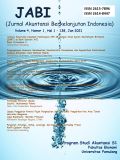Pengaruh Kompetensi Auditor, Komitmen Profesional dan Etika Profesi terhadap Perilaku Disfungsional Auditor
DOI:
https://doi.org/10.32493/JABI.v4i2.y2021.p204-217Keywords:
Auditor Competence, Professional Commitment, Professional Ethics, Dysfunctional BehaviorAbstract
Abstract
The research problem is related to the dysfunctional behavior of auditors in performing audit tasks. The research objective was to measure and analyze the influence of auditor competence, professional commitment and professional ethics on the dysfunctional behavior of auditors at the Representative Audit Board of South Sulawesi Province. The data collection method used a questionnaire technique with a total of 54 auditors as respondents. Data analysis using multiple regression analysis techniques. The results showed that auditor competence and professional ethics have a negative and significant effect on auditors' dysfunctional behavior. Meanwhile, professional commitment has no effect on auditors' dysfunctional behavior.
Abstrak
Masalah penelitian terkait dengan perilaku disfungsional auditor dalam melakukan tugas audit. Tujuan penelitian untuk mengukur dan menganalisis pengaruh kompetensi auditor, komitmen profesional dan etika profesi terhadap perilaku disfungsional auditor pada Badan Pemeriksa Keuangan Perwakilan Propinsi Sulawesi Selatan. Metode pengumpulan data menggunakan teknik kuesioner dengan jumlah responden sebanyak 54 auditor. Analisis data menggunakan teknik analisis regresi berganda. Hasil penelitian menunjukan bahwa kompetensi auditor dan etika profesi berpengaruh negatif dan signifikan terhadap perilaku disfungsional auditor. Sedangkan komitmen profesional tidak berpengaruh terhadap perilaku disfungsional auditor.
References
Agus, S., & Ardana, I. C. (2009). Etika Bisnis dan Profesi : Tantangan Membangun Manusia Seutuhnya. Salemba Empat.
Chasbiandani, T., Satra, I., & Rizal, N. (2019). Sifat Machiavellian Dan Etika Profesi Dalam Perilaku. Jurnal Ekonomi : Journal of Economic, 10(2), 150–160.
Fa’niansah, N., Mursalim, & Amiruddin. (2020). Pengaruh Locus of Control, Job Performance, Komitmen Profesionalisme, Time Budged Pressure, Etika Profesi Terhadap Perilaku Disfungsional Auditor. Jurnal Ilmu Ekonomi, 3(3), 43–56.
Ferdinand, A. (2011). Metode Penelitian Manajemen. Badan Penerbit Universitas Diponegoro.
Flint, D. (1988). Philosophy and Principles of Auditing. Macmilan Education Ltd.
Ghozali, I. (2005). Aplikasi Analisis Multivariate Dengan Program SPSS. BP Universitas Diponegoro.
González, T. F., & Guillén, M. (2008). Organizational commitment: A proposal for a wider ethical conceptualization of “normative commitment.†Journal of Business Ethics, 78(3), 401–414. https://doi.org/10.1007/s10551-006-9333-9
Hartanto, O. (2016). Pengaruh Locus of Control, Tekanan Anggaran Waktu Komitmen Profesional, Terhadap Perilaku Disfungsional Auditor. EKUITAS (Jurnal Ekonomi Dan Keuangan), 20(4), 473. https://doi.org/10.24034/j25485024.y2016.v20.i4.1826
Istiqomah, S. F., & Hanny, R. (2017). Studi Empiris Faktor-Faktor Yang Memengaruhi Perilaku Disfungsional Audit. Jurnal Akuntansi, 21(2), 184–207. https://doi.org/10.24912/ja.v21i2.194
Ludigdo, U. (2007). Paradoks Etika Akuntan. Pustaka Pelajar.
Mahardini, N. M., Sujana, E., & Adiputra, M. P. (2014). Pengaruh Etika Profesi dan Tekanan Anggaran Waktu Terhadap Perilaku Disfungsional Auditor (Studi Kasus pada Kantor Akuntan Publik di Provinsi Bali). E-Journal S1 Akutansi Universitas Pendidikan Ganesha, 2(1), 1–11.
Malahayati, B. A., Maslichah, & Mawardi, M. C. (2019). Pengaruh Profesionalisme dan Perilaku Disfungsional Auditor Pada Kualitas Audit dengan Kepuasan Kerja Sebagai Variabel Moderasi. E-JRA, 08(05), 31–43.
Martini, N. P. R., & Pertama, I. G. A. W. (2019). Perilaku Disfungsional Auditor: Dampak Kompetensi Auditor, Sifat Machiavellian, Tekanan Waktu Dan Tekanan Ketaatan (Studi Kasus KAP di Bali). Wacana Ekonomi (Jurnal Ekonomi, Bisnis Dan Akuntansi), 18(1), 66–74. https://ejournal.warmadewa.ac.id/index.php/wacana_ekonomi
Mautz, R. K., & Sharaf, H. A. (1980). The Philosophy Of Auditing. American Accounting Association.
Medina, L. E., & Challen, A. E. (2019). Locus Of Control, Turnover Intention, Kinerja Auditor, Etika Auditor, Komitmen Organisasi Dan Dysfunctional Audit Behavior. Jurnal Pajak, Akuntansi, Sistem Informasi, Dan Auditing, 1(1), 1–21.
Oktaviani, W., Hardi, & Silfi, A. (2016). Pengaruh Personalitas Auditor dan Etika Profesi Terhadap Penerimaan Perilaku Audit Disfungsional (Studi Empiris Bpk RI Perwakilan Provinsi Riau). JOMFekom, 4(1), 843–857. https://media.neliti.com/media/publications/125589-ID-analisis-dampak-pemekaran-daerah-ditinja.pdf
Peraturan BPK RI No. 1 Tahun 2017 Tentang : Standar Pemeriksaan Keuangan Negara.
Pura, R. (2017). Effects of Auditor Competence, Information Technology, Accounting Information Systems and Organizational Commitment on Auditors’ Performance at The State Audit Agency, In South Sulawesi. Scientific Research Journal, V(X), 16–22.
Riduwan. (2008). Metode dan Teknik Menyusun Tesis. Alfabeta.
Sekaran, U., & Bougie, R. (2017). Metode Penelitian untuk Bisnis. Salemba Empat.
Sugiyono. (2016). Metode Penelitian Manajemen (Bandung). Alfabeta.
Wahyuni, S. (2017). Pengaruh Komitmen Profesional Multi Dimensi Terhadap Perilaku Underreporting of Time ( Studi Empiris Pada Kantor Akuntan Publik Second Tiers Di Indonesia ). 14(2).
Downloads
Published
Issue
Section
License
Authors who publish with this journal agree to the following terms:
- Authors retain copyright and grant the journal right of first publication with the work simultaneously licensed under a Creative Commons Attribution License that allows others to share the work with an acknowledgement of the work's authorship and initial publication in this journal.
- Authors are able to enter into separate, additional contractual arrangements for the non-exclusive distribution of the journal's published version of the work (e.g., post it to an institutional repository or publish it in a book), with an acknowledgement of its initial publication in this journal.
- Authors are permitted and encouraged to post their work online (e.g., in institutional repositories or on their website) prior to and during the submission process, as it can lead to productive exchanges, as well as earlier and greater citation of published work (See The Effect of Open Access)

This work is licensed under a Creative Commons Attribution-ShareAlike 4.0 International License.


 PUBLICATION ETHICS
PUBLICATION ETHICS FOCUS AND SCOPE
FOCUS AND SCOPE EDITORIAL TEAM
EDITORIAL TEAM REVIEW PROCESS
REVIEW PROCESS CONTACT US
CONTACT US AUTHOR GUIDELINES
AUTHOR GUIDELINES




